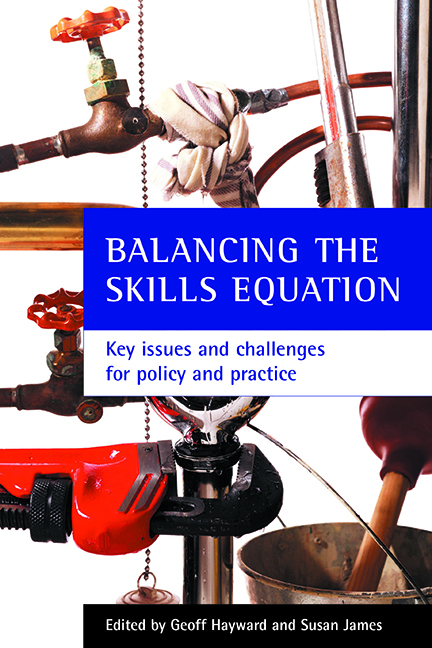Book contents
- Frontmatter
- Contents
- Acknowledgements
- Preface
- Notes on contributors
- one Producing skills: conundrums and possibilities
- two Fit for purpose? Sixty years of VET policy in England
- three The European policy regarding education and training: a critical assessment
- four ‘I can’t believe it’s not skill’: the changing meaning of skill in the UK context and some implications
- five Qualifying for a job: an educational and economic audit of the English 14-19 education and training system
- six Does apprenticeship still have meaning in the UK? The consequences of voluntarism and sectoral change
- seven Tradition and reform: modernising the German dual system of vocational education
- eight Learning in the workplace: reappraisals and reconceptions
- nine Interests, arguments and ideologies: employers’ involvement in education–business partnerships in the US and the UK
- ten Compatible higher education systems and the European labour market: Bologna and beyond
- eleven The expansion of higher education: economic necessity or hyperinflation?
- twelve Becoming a chef: the politics and culture of learning
- Index
- Also available from The Policy Press
twelve - Becoming a chef: the politics and culture of learning
Published online by Cambridge University Press: 20 January 2022
- Frontmatter
- Contents
- Acknowledgements
- Preface
- Notes on contributors
- one Producing skills: conundrums and possibilities
- two Fit for purpose? Sixty years of VET policy in England
- three The European policy regarding education and training: a critical assessment
- four ‘I can’t believe it’s not skill’: the changing meaning of skill in the UK context and some implications
- five Qualifying for a job: an educational and economic audit of the English 14-19 education and training system
- six Does apprenticeship still have meaning in the UK? The consequences of voluntarism and sectoral change
- seven Tradition and reform: modernising the German dual system of vocational education
- eight Learning in the workplace: reappraisals and reconceptions
- nine Interests, arguments and ideologies: employers’ involvement in education–business partnerships in the US and the UK
- ten Compatible higher education systems and the European labour market: Bologna and beyond
- eleven The expansion of higher education: economic necessity or hyperinflation?
- twelve Becoming a chef: the politics and culture of learning
- Index
- Also available from The Policy Press
Summary
Introduction
A recurrent theme through the chapters in this book is the desire on the part of policy makers to reform their nation’s education and training systems. A clear objective is to bring education and training systems into closer alignment with perceived labour market needs. To achieve this, a leitmotif in the political rhetoric of education and training reform is the implementation of new technologies of outcomes-based assessment. For example, the discussions of the EC’s Technical Working Group (cedefop.communityzero.com/credittransfer) on credit transfer in vocational education and training (VET) have indicated that:
in addition to measuring the duration of training or equivalent work load there must also be a basic understanding about qualitative elements describing the outcomes in terms of knowledge, skills and competences which are necessary to perform in different job roles and work situations within a sector, labour market segment or an occupational family [and] that learning performance it was agreed thus far should be measured towards outcomes.
Identifying and measuring such outcomes and competences, it is believed, will enable a transparent system of qualifications to be developed at both national and international levels. This may be a desirable aim but achieving it, once a technology for describing and assessing outcomes has been developed, is too often seen as a mere matter of changing systems and producing new qualifications that will then be adopted by both the supply and demand side of the skills equation. However, the chapters by Stanton and Bailey (Chapter Two), Ertl (Chapter Seven), Haug (Chapter Ten) and Deer (Chapter Eleven) speak to the social, political and economic challenges inherent in implementing such reform.
The rather naive techno-rationalistic view of reform alluded to earlier is embedded within a wider politics of learning that largely ignores the cultures of learning embedded in the social practices of workplaces. This politics is mobilized within a discourse that:
• creates unitary constructs of ‘employer’ and ‘worker’ necessary to construct national systems of qualifications;
• emphasises deregulation of labour markets in order to increase labour flexibility; and
• redefines concepts such as skill in ways that emphasize the responsibility of individuals to maintain their employability in a globalised economy, rather than the role of the political collective in maintaining opportunities for people to live fulfilling lives.
- Type
- Chapter
- Information
- Balancing the Skills EquationKey Issues and Challenges for Policy and Practice, pp. 219 - 244Publisher: Bristol University PressPrint publication year: 2004

